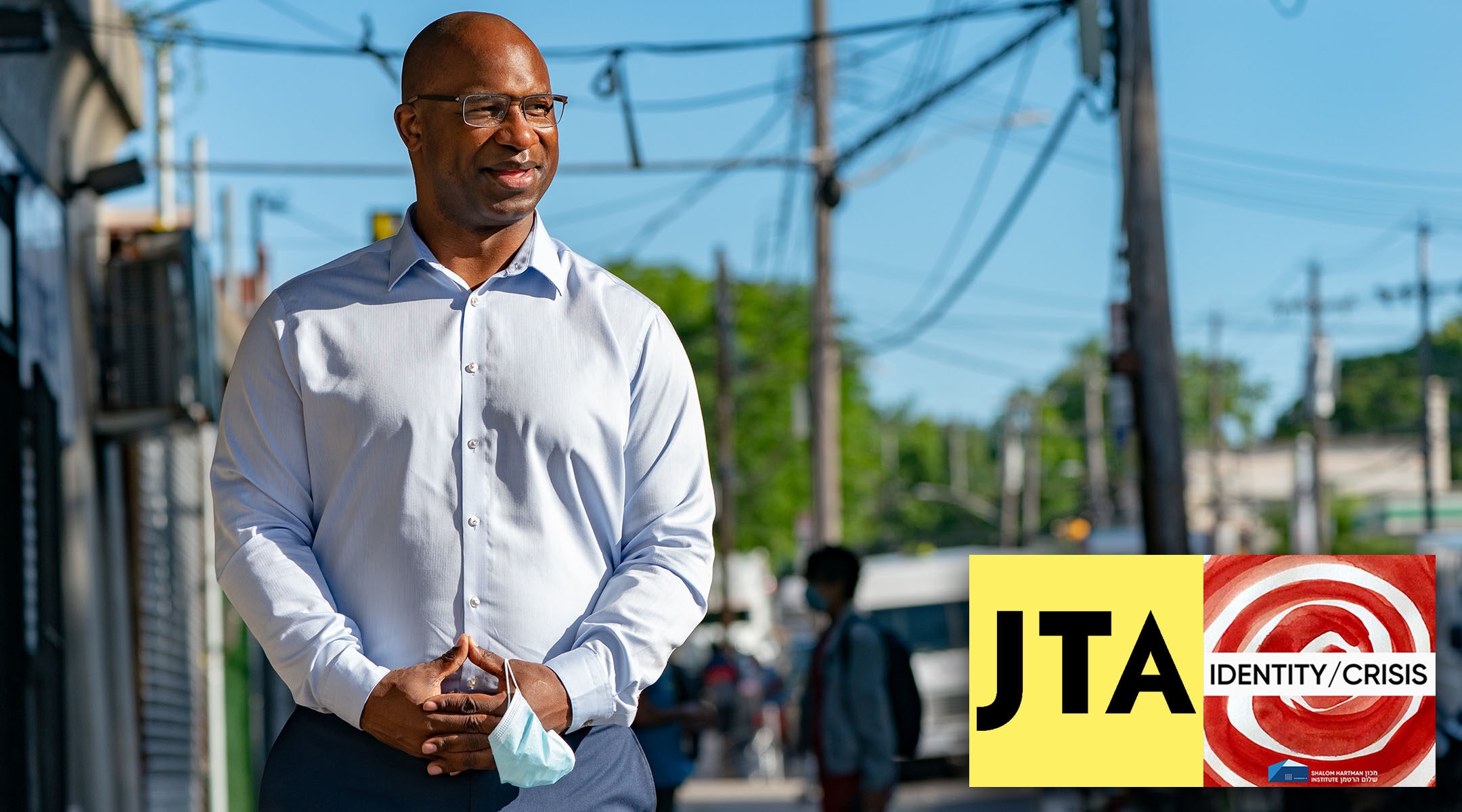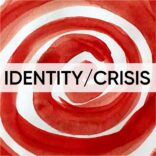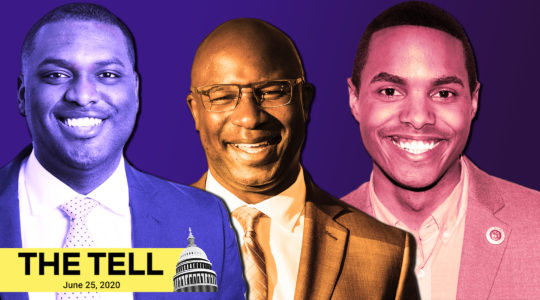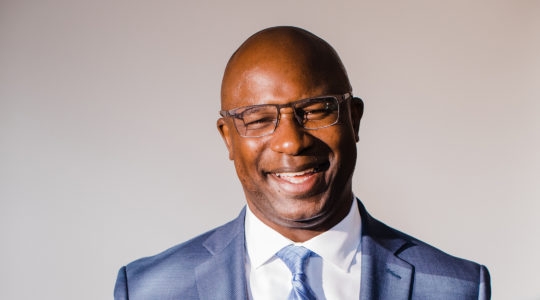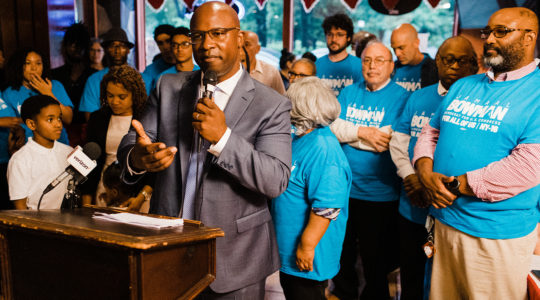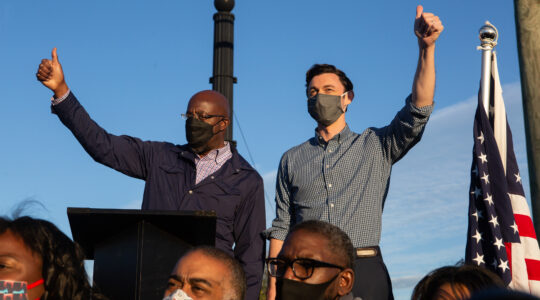(JTA) — The Jewish Telegraphic Agency is partnering with the Shalom Hartman Institute of North America, a center of Jewish thought and education in Israel and North America, on Identity/Crisis, a podcast about Jewish news and ideas.
JTA reporters will join Hartman Institute President Yehuda Kurtzer in future episodes, and we’ll be sharing transcripts of each conversation. You can listen to past episodes here. Have an idea for an episode? Let us know.
Click here to listen to this episode.
Kurtzer: Our guest this week is Congressman-elect Jamaal Bowman, one of the most surprising political stories of the year 2020. It’s a really important conversation for the Jewish community, which is the audience of this podcast, both in light of the individual he defeated —Eliot Engel — and is replacing in Congress; in light of his constituency, which includes a significant percentage of Jewish voters; and for a whole host of other reasons we’ll discuss.
Two disclaimers: We don’t usually have politicians or elected officials on this show, so I should make clear that the Hartman Institute is nonpartisan; no endorsements are made or implied. Also, I am not only the host of the show. I am a constituent of Bronx 15, so this is personal and really exciting.
Congressman-elect, I know you must be insanely busy. I saw some pictures on social media of your, what was it called? The …
Bowman: The orientation.
Orientation. Thank you. So thank you for coming on the show today.
Of course. Just one point of clarification. I am the congressman-elect for New York 16. Is that what you meant to say?
That’s what I meant to say. I do vote in the correct district. First of all, tell us a little bit about your motivations to enter political life. I know you came in as an outsider to this race. You challenged a long-tenured congressman, which is a really bold thing to do. What drove that decision to kind of take up this mantle of public leadership right now?
I was indirectly involved in political life through my work in education over the last 20 years — you know, with teacher salaries and pensions funded by taxpayer dollars, so what happens in the political arena directly impacts what happens in our schools.
I worked as an elementary school teacher, a high school counselor and a middle school principal, and I was consistently fighting for more funding for our public schools, more resources, and always wondered why places like Scarsdale and Bronxville had more resources for their kids than we had for our kids in the Bronx.
I knew that a lot of the practices like annual standardized testing were harmful to kids. We have more cops in our schools than counselors, so it was a lot happening in our schools that led to me questioning what was going on in our political arena. I just thought it was unfair and I thought it was unacceptable. I learned very quickly, if you’re Black or Latino or poor, you just have less resources — not just for schools, but for your community, and I felt we can do more in our political arena to really center our children, center those who are most vulnerable, and that’s what led to me exploring a potential run.
It’s actually quite poignant in the middle of this pandemic for somebody to be coming out of the public education system, one of the institutions most affected by this crisis. We have such a screwed-up relationship with people we call “essential workers” and who we actually value. So to come out of that kind of line of work and to pursue this kind of public leadership is pretty extraordinary. I don’t want to say this in the wrong way, but Eliot Engel had a long tenure in this district, was winning his primaries, and obviously in the general for an overwhelmingly Democratic district won easily. I suspect a lot of people probably discouraged you from going straight there. So it’s not just what made you want to be involved with political life — what made you think you could actually win?
[laughs] Well, my school, the school that I founded, is actually located in the northeast corridor of the district, so I had 10 years of experience working directly with people who were most impacted by bad policy that came from Washington during Congressman Engel’s tenure.
It was not just about Congressman Engel and who he was as an individual. It’s about him being a part of a system that continued to disenfranchise and marginalize Black and Brown communities — I mean, policy that goes back way before Engel, like redlining and the GI Bill and the Homestead Act and other policies that just centered growing white wealth in the white community and didn’t do the same for Black and Brown communities.
I knew I had good roots in the district as an educator. Also living in Yonkers for a number of years, I had good roots there. While I may have been unknown in the “political arena,” I was an organizer, I was a major contributor to the opt-out movement in public education, fighting for culturally responsive curriculum, restorative justice, trauma-informed schools, fighting for equitable funding with the Alliance for Quality Education. So I was known in those circles pretty well. I got a lot of support actually initially to run, not from the “establishment,” but from the grassroots organizations.
Got it. This is like many congressional districts that are super complicated. Fieldston is one of the wealthiest neighborhoods in New York City. That’s not true if you go a mile to pretty much any direction except the west. Before we get to other features of diversity and identities, how do you imagine the work of representing such a diverse constituency, especially when your starting point is “I got a whole bunch of people in my district who have been left behind by the representation until now, but it’s not like I’m going to trade this population for that population.” How do you actually imagine that kind of representation?
I’ve always felt from the outside that wealthy people don’t like inequality either, and they know it’s unfair that there are certain communities that continue to suffer and continue to struggle, and if those wealthy communities were given the opportunity to help and support and engage and have those conversations that they would. So I’ve always felt that in my heart, and what I’ve learned throughout my campaign is that that’s actually true.
Whether I’m speaking to people in Fieldston or Riverdale or Bronxville or Scarsdale, people are like, “Hey, Jamaal, let us know how we can help.” So people are ready to lean in, ready to be supportive and ready to help.
But they also care about a lot of the issues that the people in the Northeast Bronx care about. They want their schools to remain exemplary. They care about climate justice. They care about police reform. They know that it’s screwed up that George Floyd was lynched in broad daylight in front of everyone, and that COVID has disproportionately killed poor Black and Brown people, and that mass incarceration continues to persist.
People know things are screwed up. They just wanted and needed a pathway to plug in to be more helpful. And I hope that I could be that bridge, that conduit, that liaison between one community and another.
And yes, it’s very true that I have to spend maybe a little bit more of my time in certain areas of the district because a cop killed someone in New Rochelle a year ago and we have to respond to that cop — killed someone and killed another cop through friendly fire in Edenwald Projects — and we have to respond to that. COVID is ravaging, and the irony of COVID is, it hit the Jewish community in New Rochelle and Riverdale early and very aggressively, you know, SAR shut down before the state shut down. But then it also hit Co-op City and Edenwald in the Northeast Bronx, and it continues to hit those areas hard. So there’s common ground and there’s common interests, and my job is to bridge those gaps and remind everyone that we’re working together for the betterment of all of us.
The COVID metaphor is so profound because I have a kid at SAR, and so our family was in it right away. But we had, on a personal level and on a communal level, not only the resources to get through it in a particular way, but the school, for instance, was able to raise millions of dollars over the summer to fix the HVAC, to redesign the school, and they’ve been open continuously since the beginning of the year. So to watch a disease that, in and of itself, doesn’t discriminate play out with totally different manifestations for this community, in this community, less than a mile from each other, is just devastating.
However, I’ll say, I think there’s always a calculus of, “what am I going to gain and what am I going to lose?” There is a certain amount of fear for communities that are affluent or are organized in particular ways of, “Does the change in our representations, does the change in our values mean that I have to lose?” Part of what we have to get to is, how do we get to a place where as you said, folks who are well off view structural justice and structural change as not just a thing that they care about and they think is good, but it’s also in a deep way in their own interest?
That’s a very valid point. I know it’s a concern of many throughout the community. I’ve never looked at it as robbing from Peter to pay Paul. I’ve never looked at it as, OK, in order for us to invest in Edenwald, we have to take a little bit away from Fieldston. I’ve never looked at it that way.
Yes, people like Jeff Bezos and others need to contribute their fair share to our democracy. Right now that is not happening. Large corporations like Amazon need to be held accountable for hiding billions of dollars in offshore accounts and not contributing to our democracy. Yes, our tax system needs to be a lot more progressive, especially at the very top — that does have to happen.
However, the federal government — and this is one of the reasons why I ran for Congress versus, you know, a city or state position — can authorize spending in an area to jumpstart an economy. The problem is, historically, they haven’t done that with the Black community. They haven’t authorized that spending, but they’ve authorized it for the white community.
The Homestead Act after slavery gave millions of acres of land to the white community and the Black community never received their 40 acres and a mule. To quote Dr. King, “It was freedom and famine at the same time.” The GI Bill after World War II, and in response to the Great Depression with the New Deal, we invested $130 billion over 30 years to create the suburbs and grow the white middle class. Ninety-eight percent of those loans went to the white community and African-Americans were kept out, which created communities of concentrated poverty, which we see in Edenwald and Yonkers and other areas.
So yes, there needs to be additional contribution from the wealthy, but also our federal government needs to acknowledge the historical harms of racism, how they continue to persist, and authorize spending as a result of that acknowledgement.
Great. I’ll come back to race in a little bit, but I’d love to talk a little bit about the conversation that started with the Jewish community during the primary campaign. It was heated, but I have to say, I was really happy on a personal level that it didn’t get heated to a place that could have created real damage either within the Jewish community, or between the Jewish community and the Black community broadly construed.
There was a powerful moment where there was an exchange of letters or articles first written by Rabbi Avi Weiss. I was really amazed not only that you chose to engage Rabbi Weiss in public, but by the tenor and the civility of that conversation. I don’t know that Rabbi Weiss ultimately — Rabbi Weiss is the rabbi of Hebrew Institute of Riverdale, leading rabbi in the community, also a longtime social justice advocate on a whole bunch of causes — I’m not sure Rabbi Weiss ultimately voted for you, but it almost didn’t matter because the conversation actually put on the table in a serious way what certain members of the Jewish community’s concerns were about losing Engel in Congress and his role in the Foreign Affairs Committee and getting any newcomer, but certainly a newcomer who didn’t necessarily have the bona fides on issues like Israel, which they cared about.
Tell us a little bit of how that exchange came about, what motivated you to respond and to respond the way that you did.
I was happy with the open letter from Rabbi Weiss because it gave me an opportunity to respond very publicly to maybe a part of the community that they didn’t have a chance to meet me in person or engage with me beyond maybe a quote they read somewhere or an interview they saw me conduct on a particular outlet. It gave me the opportunity to respond very publicly.
What I wanted to convey was empathy and compassion and an understanding of the plight and the fears of the Jewish community, being a Black man in America. I mean, that’s something that I felt throughout my entire life, like an existential threat from the establishment, from the system, from others, simply because of who you are.
I also wanted to draw the line between not just the Jewish community and the Black community, but the Palestinian community as well — how there’s a fear, there’s a distrust, there’s a worry in terms of losing our homeland and our humanity as we go through engaging with each other.
I felt it was an opportunity to respond with that level of empathy and compassion and to hopefully draw parallels and connections between our three communities in a way that can continue a conversation that gets us to a place of peace and justice for all people, regardless of background, because I truly believe that that’s where we can go.
We just have to figure out how to get there despite a hard history. I’m a Black man in America; I can’t ignore or disown or seek to harm white people on my path to justice and freedom and equality. We have to live together and work together and figure out what that looks like.
I’m very thankful that from the very beginning of our campaign, there were members of the Jewish community that opened themselves up to me as resources, as mentors, to help me learn about Jewish issues generally and the issue of Israel very specifically. What I learned is, there’s diversity in the Jewish community like there is in every community, and that was very helpful towards my understanding, but also just affirming what I believed in the beginning: This is about humanity and this is about human rights, and we need to uplift the human rights of everyone and figure out how to live in the world together and love and compassion.
Do you think it worked? Do you think that there were sectors of the Jewish community that were either really pro-Engel because of his Israel politics or at least just proud of the fact that they had a representative in Washington who was the chair of Foreign Affairs, they had more access to power? Do you think that they were able to hear that message through that open letter, and do you think that it creates an opening for you now to keep building these relationships?
I think it moved the ball forward where people are open to different conversations and to engaging me in those conversations. I was very moved throughout the campaign as I met different segments and individuals of the Jewish community.
I met one person, a mom who happened to be in Rye on this particular day with her daughter, and we had a nice conversation, and she said, “I already voted for you, but I wanted to know your position on BDS.” That was pretty moving because, wow, she actually voted for me without knowing what my position on BDS [the movement to boycott, divest, and sanction Israel] was.
And then I reaffirmed that it was not a movement that I support and I explained to her why, but that touched me because it was like, OK, and this is what I learned.
The Jewish community cares about a lot of things in addition to Israel. Israel is very important, but they care about housing and jobs and health care and education and family and community, and all of the things that really led to me running for office in the first place. So I was happy that who I am was continuously communicated throughout the campaign, despite people knowing all the details of every policy position that I support.
Every study that’s ever been done of the Jewish community voting patterns indicates that, even to the portion of the electorate that cares deeply about Israel, it is one of a set of issues that they care about. There are very, very few people in the Jewish community for whom Israel is the principal issue on which they vote. So, in your example, it’s very honest for a voter to say, “I already voted for you, but can you tell me this?” But it’s probably not that uncommon.
People are making their decision on a whole bunch of issues, but they do want to get clarification. I think the thing that I’ll tell you personally frightened me a little bit is that you’ve indicated that you’re experiencing the divisions within the Jewish community. Our community in America is undergoing unbelievable change over the last two generations in terms of the identity and ideologies of American Jews, and a lot of those debates are taking place more in public than they might have a couple of generations ago.
I noticed throughout the campaign, you have the support of a lot of Jewish activism on the left that was really excited to get behind your campaign — I think really excited, personally, to be anti-Engel for all of their own reasons. And the thing that sometimes makes me a little nervous — I apologize if it sounds a little paternalistic — is that sometimes politicians get baited into an internal conflict that is taking place within the Jewish community, that they’re trying to air their grievances with the mainstream Jewish community and using certain politicians as their credibility vehicle, like “Now I got my Jews.” But it doesn’t necessarily benefit politicians who need to represent a diverse constituency. So I’m curious how you navigate that. Are you just, like, saying, “You know what, I’ll take the support from wherever I can get it!”
[laughs] That’s a great question and great framing it and thank you for naming it. I’ve never felt baited to take one side versus another within some of those conflicts. I’ve just stayed rooted in my values and the values of human rights, no matter what, and the things that my mother taught me. I also know that growing up in certain communities, that’s their beef. They gotta work that out. I’m not getting involved in that fight because I don’t want people outside of the African-American community to speak about what African-Americans should do either. Right?
So it was that kind of thing. Some of it is, I can offer my experiences, my perspective as a Black man in this space, but I’m also not Jewish. I’m very clear on that, and I know there are conversations in the Jewish community that are going to happen that should happen amongst the Jewish community.
So I’ve never felt pulled in in a way where I need to take one side over another. I am a progressive. I am liberal. I am more of a human rights advocate than anything else. So I used to say throughout the campaign, like I feel sometimes hypocritical speaking about Israel and I’ve never been there. I just read about and had conversations about it. So I’ll add an opinion if I’m asked, but I try not to wade into waters that may be a little bit too deep for me as someone who’s not a part of the community.
It’s interesting that the Palestinian cause is viewed as being so central to this progressive term in America. And it seems to me as an outsider, I get why the Palestinian cause is really important to Congresswoman Tlaib. She’s Palestinian. I don’t begrudge her her politics.
It just seems like it’s such a different issue for a person like you, that the stakes of that issue or that concern seems so different than the stakes on policing and housing and climate and race and economic justice and all of those things. Why do you think that the Palestinian cause is considered one of the pillars of the progressive movement, and do you think you’re going to be able to continue to navigate that piece of, “I’ll stay in the shallow water on this and focus elsewhere,” especially when you have to make alliances? There was language of you being “connected to the Squad,” congresswomen for whom this is a major issue. Why do you think it’s so important, and do you think there’s a way to maintain that arms length on this issue?
Well, it’s important in this district in particular because of the large Jewish constituency in this district —
Right.
And a large constituency that cares about Israel. If we’re talking about Israel, we have to talk about Palestine, right? If we’re talking about Jews in Israel, we have to talk about the Palestinians in Israel as well. We have to talk about annexation and occupation and the behavior of Benjamin Netanyahu, if the progressive cause is rooted in human rights, which I think it is.
A threat to anyone’s human rights is a threat to everyone’s human rights. And one of the things I would say often throughout the campaign is, if we’re really serious about the long-term safety and security of Israel, we have to uplift the human rights of the Palestinian people, and we have to do better than we’re currently doing with regard to that issue.
That’s what I feel; that’s what I believe. I think that’s why you can’t talk about one without the other. Some groups try to do that, and I think that’s wrong. I think it’s ignoring the power dynamic and it’s ignoring some of what’s happening right in front of our face. Whether it’s Palestinians, Jewish people, African-American people, the LGBT community, women, the poor, the indigenous, Latinx — if oppression is happening anywhere, or the perception of oppression is something that we have to deal with, especially as the United States of America, which claims to be the most powerful nation in the world. If we are the most powerful nation, we have a responsibility to respond to potential human rights violations that are happening anywhere in the world. That’s my take.
From a policy standpoint, one of those particular policy issues that’s emerging among the progressive camp is the argument to condition aid to Israel. America has done historically billions of dollars of foreign aid, principally through military contracts to Israel, especially since the peace treaties of the late ’70s with Egypt.
I would love to hear you talk more about this. I’ll just put my own cards on the table. I am pro-peace process — is that an ideological thing in that sense? I guess what I have never understood, and certainly not agreed with from a policy standpoint, is that aid to Israel and to the Arab world has always been used as an incentive to amortize risk. Israel, you’re about to give back a huge portion of your land conquered in war to Egypt. You’re opening up a huge border. We want you to take that risk. We’re going to make sure you have the military advantage that it’ll never wind up with an Egyptian invasion, and it has worked. Even the last couple of years, the UAE deal — it’s very clearly “We’re going to make it worth your while; we’re going to use money and military technology to make it worth the while to create these deals as imperfect as they are.”
But the arguments to condition aid seem to reverse this. Instead of using carrots, it’s using a stick. It’s saying, “We’re going to create potential damage to your sense of security.” There’s no history that threatening people in the region in order to get them to take risk will ever work. So why change this up? Do the Palestinians even want this? Do they want Israel to have less military aid? I’m just not convinced of it. What’s the logic between the conditioning aid argument?
If we are serious about a two-state solution and serious about a Palestinian state and investing there and building that up and uplifting that, we can never get there if Netanyahu continues to do what he’s currently doing.
I think the conversation of conditioning aid is one of many strategies that have been discussed to dissuade him from doing that, and dissuading this sort of far-right ideology that leads to the occupation and annexation to continue.
That’s where I think the conversation is coming from. We’ve been saying for several decades, “We want a two-state solution.” We are no closer today than we were several decades ago, arguably, and Netanyahu’s making it worse. What can we do? I think that’s where the idea of conditioning aid has entered the conversation because maybe it’s only through that method that Netanyahu will stop.
There are probably other methods that need to be explored, but that’s one that I’ve heard and even shared that I may potentially support to stop what’s happening in terms of the undermining of a true two-state solution. But it’s complicated, man.
You mentioned the UAE, you mentioned Egypt. The Middle East has been — ever since I’ve been alive, there’s been conflict. I’ve heard from the outside a lot of lip service around how to solve that conflict, and we’re no closer, it seems, to solving that conflict than we were before, especially with Trump pulling out of the Iran nuclear deal, the recent assassination of the Iran nuclear scientists. The conflict continues. The question is, how do we get to peace? And I’m open to any dialogue that will get us there, even though I don’t think I’m going to be on the Foreign Affairs Committee; it may not even be my issue. The fact that I represent a large Jewish population, it always comes up.
I guess my personal view on this is: I would love to see a push from the progressive caucus on Israel/Palestine that sounds more like when you talk about. How do we open up more resources from the federal government and equalize the resources from the federal government to solve this problem, as opposed to the withholding resources strategy? In other words, what would a major investment in foreign affairs in Palestinian civil infrastructure look like, which has never been done? What’s a much more significant investment in resources where you say to Israel, “Listen, we want you to take risks on the border. We want you to improve border crossings. Here, we’re going to make it possible through you with the best military technology you don’t even have yet.” In other words, more funding towards this issue as opposed to less.
No, you’re right. Authorize the investment in spending toward establishing a true Palestinian state where they can have safety and security and self-determination as well. And the messenger there is going to be key. The messenger — in my opinion, I think Joe Biden is a better messenger and person to facilitate that than Donald Trump and who he was working with. To be continued.
To be continued! Last question, but it’s a big one. We were talking a little bit about diversity within the Jewish community, diversity within the Black community. There are Black Jews, obviously, so these aren’t perfectly misaligned communities, so to speak, they’re not opposite to each other, but there’s a lot of stuff percolating, whether it was this primary this summer, or Reverend Warnock‘s campaign in Georgia right now.
We’ve been overdue for a serious reexamination of how we build ties between the Black community and the Jewish community. A lot of what passes for this conversation in the Jewish community is nostalgia. The Jewish community remembers its role positively in the civil rights era. I’m not sure the Black community remembers it as nostalgically, but also there may be a little bit of, well, that’s fine, but what have you done for me lately?
There’s oftentimes a lot of invisibility in the Jewish community about our role in the racial justice story. I’m very sensitive to the fact that living in Riverdale, the school that I send my kids to exists in Riverdale because the Jewish community moved out of the Grand Concourse in the ’50s and ’60s and moved to Riverdale, so it was part of white flight and part of, effectively, de facto segregation to build this powerful Jewish school.
What’s the next step to move this forward? What do we need to do as a Jewish community to engage much more seriously and rigorously in relationship building in the Black community and in the actual work? The relationship building is only as good as the goals that you’re trying to create out of those relationships. What do we need to do in the Jewish community to move this agenda forward?
It’s a great question. First of all, SAR is a great school, by the way. I had a chance to visit the elementary school and just the design itself. We need schools like this all over the country. Great school, great design.
It’s not the responsibility of the Jewish community or any other community to decide to help the Black community or to help any historically oppressed community. That decision is an individual decision, a group decision, and if the “Jewish community” would like to be a part of that, absolutely, we welcome that.
What I’ve learned also throughout the campaign is to be Jewish is to be someone who cares about social justice in all its forms. I appreciate and love that, and know that many African-Americans who identify as being followers of Christ, or even Muslim or other, also care about social justice as well. So, for me, regardless of what community you are a part of, if you care about social justice, you also care about racial justice, and if you care about justice, you care about equality and you care about the human rights of everyone.
So how do we come together as people who care about human rights and social justice to fight for social justice in all its forms. Centered in America’s institution is the legacy of racism in our country and the legacy of slavery. I’m mentioning slavery not because I want to live in the past and have America respond to what happened in the past, but what’s happened to Black people in America is a continuation of that legacy that has evolved to include wealth inequality, mass incarceration, police brutality and missing education very explicitly.
When we look at housing infrastructure, when we look at health outcomes, all of this is rooted in our beginning as a country that enslaved African people, but continued through policy to marginalize, oppress and terrorize African-American communities through slavery by another name. Because of that legacy, we welcome, and we would love all communities to be a part of, pushing back against that legacy that continues to harm us.
One of the things that I’ve been talking a lot about is reparations: the need for it, the need for a process of truth, reconciliation and restitution, and telling the story of other groups that received reparations. We’re a part of a process of truth and reconciliation, and one of the main groups is the Jewish community, both here as American Jews, but also in Germany. Right?
Borrowing from what we’ve done here for Japanese Americans and Jewish Americans, borrowing from what happened in Germany as part of reparations, they did truth and reconciliation there, borrowing from Rwanda, borrowing from South Africa, we need the process to happen here for African-Americans in order for us to reach the ideals of our democracy for everyone.
I would love for the Jewish community to get behind that and support that. That’s a big one, but that’s the one I think we ultimately need so we never have a Donald Trump again, and we never have people who support initiatives like QAnon running for office and winning and becoming representatives in our Congress.
I appreciate it, especially the frame of, “It’s not your job to help me, it’s not my job to help you, but we’re human beings that care about social justice and human rights.”
But I would add one other thing, which is we also care about America, and it’s so powerful to see in the history — I read this in a piece by Yoni Applebaum in The Atlantic. It was a piece called “How America Ends.” But he said the most effective voices of social change in our country’s history have been people who have appealed to the vision of what America is supposed to be, because when you do that, you triangulate, we all want that.
How do we remind ourselves that we’re a country that, even if it never actually was built on equality and justice, thought about itself as committed to equality and justice and set that as its North Star? In that vein, it doesn’t mean that race is irrelevant. It’s contextually really important for the Jewish community, Black community, for people in between those communities, to understand the context in which it’s situated, but we do need a bigger North Star of the America that we’re trying to build together.
Thank you for saying that, and democracy — the idea that every voice matters, every individual and community matters and making sure that each voice is as valuable as the next voice and the ideas that sustain a healthy democracy — has to include everyone. That’s where we’re trying to go. As we talk about reparations, we’re talking about finally healing, healing as a nation for all of us so we can move forward in a way where we can continue to fight for democracy.
I really admire your willingness to throw yourself into the fray throughout your career, and to be doing the work that you’re doing. Hopefully, congressman-elect, after this pandemic passes, we’ll invite you over to our house for a Shabbat dinner. You can consider it constituent services, but we’ll actually have a good time continuing to talk.
JTA has documented Jewish history in real-time for over a century. Keep our journalism strong by joining us in supporting independent, award-winning reporting.
